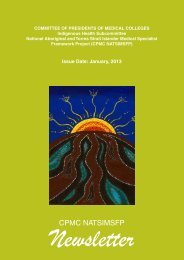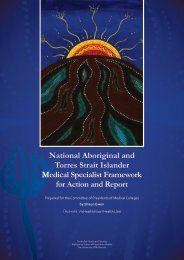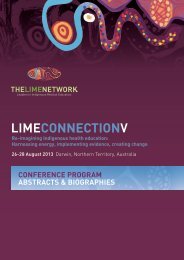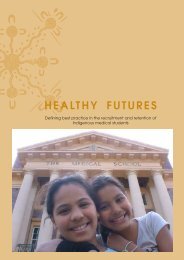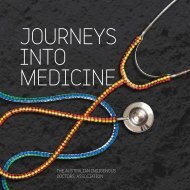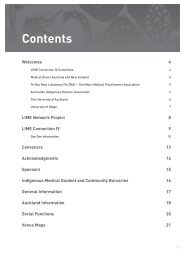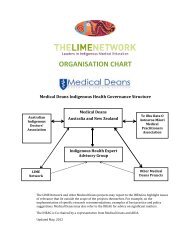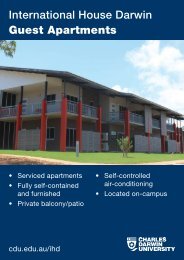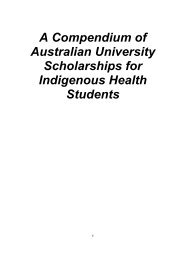abstracts and bios cover_final.indd - LIME Network
abstracts and bios cover_final.indd - LIME Network
abstracts and bios cover_final.indd - LIME Network
Create successful ePaper yourself
Turn your PDF publications into a flip-book with our unique Google optimized e-Paper software.
Indigenous simulated patients – A Master Class (1:30 – 3:00 pm)GP Accreditation SessionMr Shaun Ewen 1 , A/Professor Martina Kamaka 2 , Ms Suzanne Pitama 3 , Dr KathrynRobertson 4 , Dr Dick Sloman 51. Onemda VicHealth Koori Health Unit, Melbourne School of Population Health, The University ofMelbourne2. Department of Native Hawaiian Health, John A. Burns School of Medicine, University of Hawai'i3. Associate Dean Māori, University of Otago, Christchurch4. Cognitive Institute5. Onemda VicHealth Koori Health Unit, Melbourne School of Population Health,The University of MelbourneAbstractSimulated patients are a well established form of teaching <strong>and</strong> assessment in medical education. Theirstrengths, such as providing a powerful opportunity to incorporate the patient perspective in medicaleducation in a safe environment appropriate to the educational stage of the learner, is particularly relevant toIndigenous medical education, <strong>and</strong> yet Indigenous simulated patients have been less widely used. This masterclass brings Indigenous <strong>and</strong> non-Indigenous educators who have used Indigenous simulated patients inAustralia, New Zeal<strong>and</strong> <strong>and</strong> Hawai'i together to provide an opportunity to discuss the benefits <strong>and</strong> potential aswell as particular barriers <strong>and</strong> challenges presented by this teaching <strong>and</strong> assessment tool.Opportunity will be given for first h<strong>and</strong> experience of this educational innovation by participating in a ‘fishbowl’exercise with Indigenous simulated patients, <strong>and</strong> to consider the place of patient (actor) feedback as animportant part of learning <strong>and</strong> assessment.Facilitators: Mr Shaun EwenAs per session ‘Assessing Indigenous health’.A/Professor Martina KamakaAs per session ‘Ensuring culturally safe clinicians: Part 2’.Ms Suzanne PitamaSuzanne, Ngati Kahungunu, co-founded <strong>and</strong> is Director of the Māori/Indigenous HealthInstitute, University of Otago, Christchurch School of Medicine <strong>and</strong> Health Sciences.Suzanne has been involved in Māori health research for over 18 years. She is a keenadvocate for Kaupapa Māori based methodologies <strong>and</strong> has interests in child mentalhealth, curriculum development <strong>and</strong> Māori community based projects. Suzanneis currently leading an HRC funded project that is focusing on the prevalence ofcardiovascular disease in Māori communities. Suzanne is also undertaking her PhD looking at the place ofIndigenous health within a medical curriculum.57



